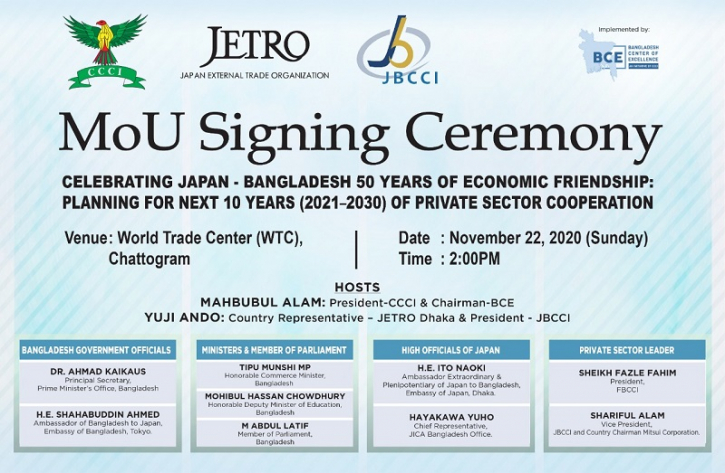Boosting Bangladesh-Japan trade: Tripartite MoU on the cards
BI Report || BusinessInsider

Photo: Courtesy
When it comes to boosting trade and investment, there is no alternative to having trade dialogues between the two parties concerned so the challenges and opportunities can be identified and suitable strategies can be developed for future good.
With this in mind, the Japan External Trade Organization (JETRO), the Japan-Bangladesh Chamber of Commerce and Industry (JBCCI), and the Chittagong Chamber of Commerce and Industries (CCCI) are going to sign a tripartite memorandum of understanding (MoU) this Sunday, to enhance bilateral trade between Japan and Bangladesh.
Under the agreement, the three bodies will hold talks with the relevant stakeholders — both public and private — to explore different opportunities and solve the existing problems regarding trade and business, said officials involved with this pact.
Tareq Rafi Bhuiyan, secretary general of JBCCI, said, "Under the pact, a comprehensive research will be conducted to determine the opportunities and challenges in investment and trade between Japan and Bangladesh.”
In addition, workshops will be organised in which public-private representatives will be present, thus creating a strategic road map for the next 10 years, he added.
In response to the question if there are any specific goals to boost trade and investment in the next 10 years, he said, "It is still at the MoU stage. After the deal is sealed, we will set specific targets in the first few meetings.”
Commerce Minister Tipu Munshi, Prime Minister's Private Industry and Investment Adviser Salman Fazlur Rahman and President of the Federation of Bangladesh Chamber of Commerce and Industry (FBCCI) Sheikh Fazle Fahim are expected to be present during the signing of the tripartite agreement.
Moreover, Principal Secretary to the Prime Minister Ahmed Kaikaus, Commerce Secretary Dr Zafar Uddin, Ambassador of Japan in Bangladesh Ito Naoki, Executive Chairman of the Bangladesh Investment Development Authority (BIDA) Sirazul Islam, Executive Chairman of the Bangladesh Economic Zone Authority (BEZA) Paban Chowdhury, among others, will be present.
Meanwhile, on Monday, JETRO Country Representative Yuji Ando, also president of JBCCI, wrote a letter to the commerce secretary.
In the letter, he said public and private sectors have to work together to achieve Bangladesh's goal of becoming a developed country by 2041.
The letter appreciated the Bangladeshi government’s initiative to develop infrastructures in a bid to strengthen the economy.
However, in addition to infrastructural development, the country needs to improve the overall business environment to attract trade and foreign investment, reads the letter, adding that the private sector will play an important role in helping Bangladesh achieve its goal.
If Bangladesh improves the business environment, Japanese investors will be keen to invest in Bangladesh; Japan — a major trading partner of Bangladesh since its independence — wants to boost trade relations between the two countries in the future, the letter adds.
Contacted, BIDA chief Sirazul Islam said there are a lot of official Japanese investments in Bangladesh, but private investment still remains at the minimum level.
Different initiatives have been taken to attract Japanese private entrepreneurs to invest in Bangladesh; however, there is a need for research to find out in which Bangladeshi sectors the Japanese entrepreneurs can invest in, he added.
According to JETRO, the number of Japanese companies operating in Bangladesh in 2008 was 70, which has increased to 278 in 2017.
In recent times, Japanese motorcycle brand Honda has set up a factory in Bangladesh. In addition, with assistance from Japan's Yamaha Motor Corporation, ACI has set up a Yamaha motorcycle factory. Japan Tobacco is investing Tk12,396 crore in Bangladesh. Nippon Steel & Sumitomo Metal, the world's third-largest steel producer, is setting up a steel plant in the Mirsarai Economic Zone in a joint venture with a local company.
As per the investment report of the Japan’s Ministry of Finance in 2017, Japanese companies have invested 1.56 billion yen (approximately Tk1,212 crore) in Bangladesh.
























